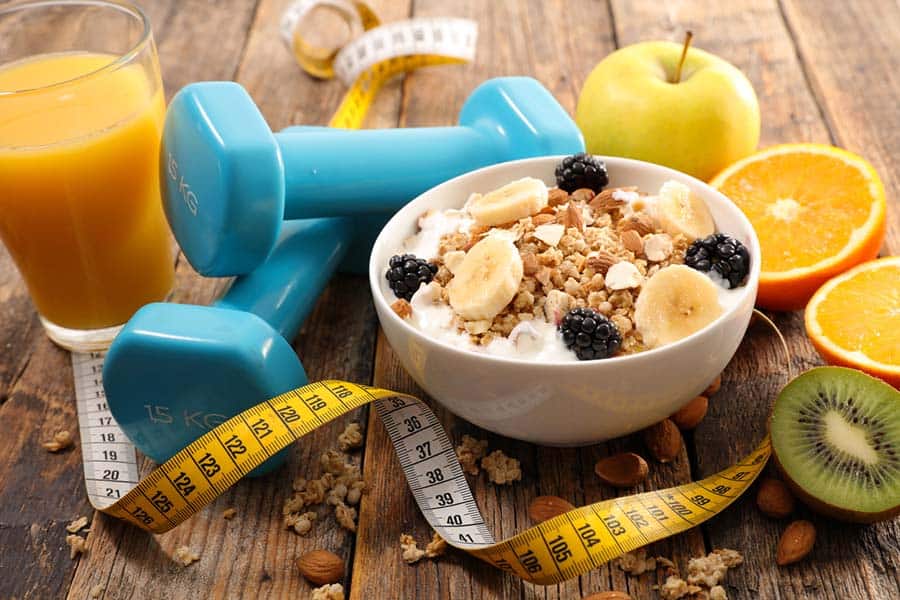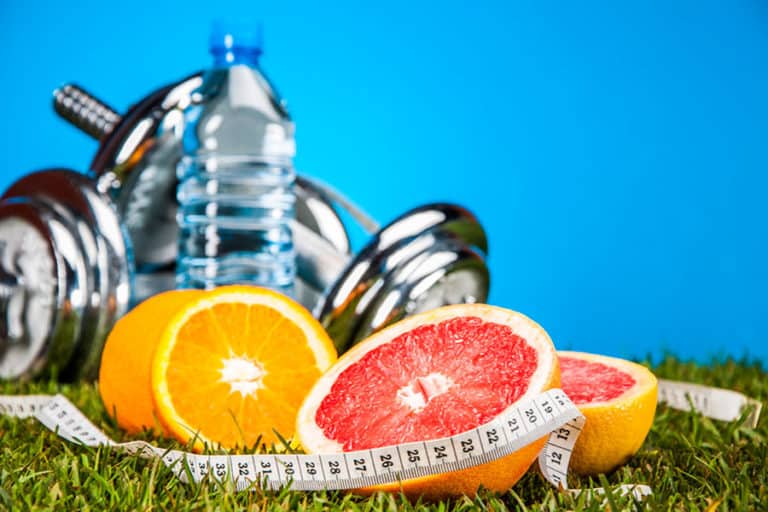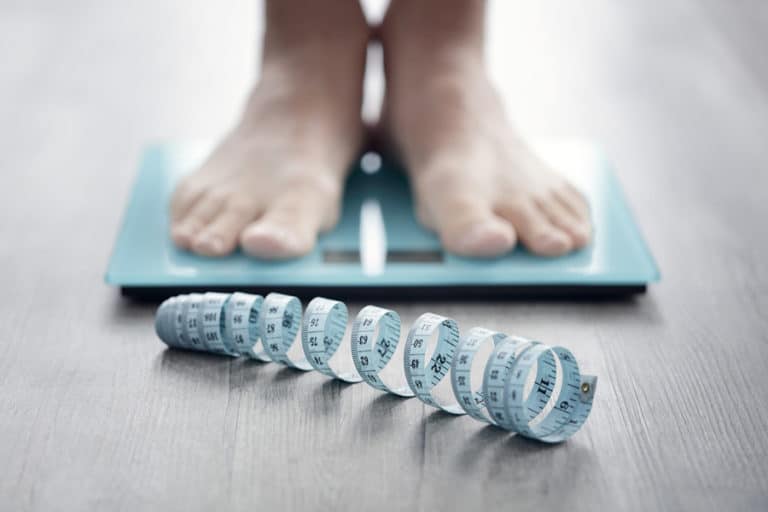Weight Loss: Is Diet or Exercise More Important?

The journey towards weight loss isn’t easy for many people because they do not know what works best for their bodies. With the help of decades of scientific research and studies, we now have the key to choosing between Diet or Exercise for weight loss.
What do you hear when someone utters the word diet? Mostly starvation, deprivation, and a constant, unsatiated hunger?
The same goes for exercises as well. Most people imagine that workouts must mean doing extreme and rigorous exercises in a gym. Screams of pain while lifting weights, and aches and agony after.
We get it. You want to lose weight. But, you are struggling between eating healthy vs working out. Let us help you decide on this tricky question – is diet or exercise more important for weight loss.
Understanding weight-loss
Weight loss rests on two pillars: Calories you consume and the calories you burn. Does this mean that you can lose as much weight as you want, if you burn as many calories as you consume each day? Science disagrees, and math is a bit more complicated than that.
Calories
Calories often sit side by side with fats in common imagination. Nothing could be farther from the truth. Calories are merely a measure of the energy released by the body each time you eat something.
Our bodies will have an Energy requirement of minimum calories per day. The USDA recommends an average of 2500 calories per day for men and 2000 for women. The requirement varies, depending on age, height, weight, and so on.
Paying attention to calorie count is essential for weight loss. The body stores all unused calories in the form of fat. This accumulates in different parts of our body and is the culprit behind weight gain.
Three factors determine our weight
- Basal metabolism, or the calories consumed for the basic functioning of the body, even when the body is at rest.
- Energy used to break down the food consumed.
- Other physical activity.
Metabolism
The body burns a considerable portion of calories even without you doing anything about it. This is the energy required to keep all the systems in your body running, down to the last cell. Along with the energy required to break down food, this makes up for most of the energy breakdown in our body.
Basal metabolism consumes 60-80 percent of your calories. Digestion of your food takes up another 10 percent. Only 10-30 percent of the calories are broken down through physical activity.
Energy Expenditure through physical activity
Our energy expenditure through physical activity seems to be a very small part of our total calorie burn. And yet, it can still cause a huge imbalance. If your diet is above the recommended levels, the imbalance becomes larger.
Physical activity in this context involves every movement of the body. From workouts at the gym to simply twirling your thumbs in boredom, everything falls under this category. Exercise is a very small part of all our physical activity.
What is more important for weight loss: Diet or exercise?
The idea that you can be slim and healthy if you burn as many calories as you consume, has had a long run. Years of research, observations, and evidence, have proven that the tips to weight loss is in creating a calorie deficit. This can be achieved only by cutting down on calorie consumption first.
Weight-loss through a well-balanced diet
Evidence is piling up in favor of diet here. Is your goal preventing weight gain and losing all the accumulated weight from those full and happy hips and thighs? Then, get yourself a much smaller plate first.
Next, watch what goes into that plate. A loaded burger or a slice of pepperoni pizza might fit in that plate too. But have you counted the number of calories in that serving?
Depending on your body type, you may have to work out anywhere between 40-50 minutes to torch those calories off.
The only way to start losing weight is to create a calorie deficit of up to 500 calories per day. Let’s do some math here:
A pound of fat is made of 3500 calories. If you cut 500 calories per day, you have a shot at losing 1 pound in an entire week. That comes close to 4 pounds lost in a month.
If your calorie intake is higher, burning 1000 calories a day is also okay. Keep in mind that the math changes each time you set your weight loss goal higher. Your results may be faster, but your challenges will be tougher as well.
Benefits of a well-balanced diet
Diet seems to be a better and easier option for a person trying to lose weight. It is easier to reduce your calorie intake by changing the food you eat. It is significantly more challenging to cut down the same amount of calories from your body through exercise.
| Did You Know: It may take you more than an hour of brisk walking to burn off that Starbucks’ Mocha Frappuccino. Swap that for a Decaf Iced Coffee and you are down from 370 calories to 36! And it is still refreshing and delicious, says a study [1]EatThis, NotThat: 28 Starbucks Items Diet Experts Love . |
That said, it is important to remember that we are talking about a well-balanced diet here. It is important to substitute unhealthy foods with healthier stuff like whole grains, healthy fats, unprocessed foods, and leaner proteins.
A well-balanced diet consisting of healthy, fresh, and unprocessed foods is important for a healthy life. A healthy and balanced diet rich in nutrients can reduce the risk of heart diseases and type 2 diabetes. Fresh fruits and vegetables, food rich in lean proteins, and omega 3 can improve your mood and enhance mental health.
Problem with diet-only weight loss program
Is it possible to stick to a diet alone for weight loss? Studies have found that people generally tend to give up on diets. Unfortunately, the diet route comes with its problems. It isn’t a sustainable weight loss method in the long run.
There are other issues with diets too. People often go from overeating to starvation, only to find themselves flying back to their old ways. When picking a diet plan, it is vital to consider keeping track of proportions later on.
Even when people choose to incorporate fruits and vegetables in their diets, they often pick the worst ones. Potatoes, iceberg lettuce, and packed juices won’t maintain the energy levels or nutrients you need when you are under calorie deprivation.
Also, most of us go for crash dieting when we decide to lose weight. Most of those diets feel impossible to keep up with after a while. The weight thus lost will come back within three to six months after you stop that diet.
Weight-loss through exercise
Every little-to-big movement of the body is a form of physical activity. Your daily exercise routine forms a small part of all the physical activities our bodies perform in a day.
Regular and sustained exercise is central to keeping our bodies healthy. But weight loss is a whole different game.
The average American is recommended [2]Centers for Disease Control and Prevention: How much physical activity do adults need? 150 minutes of moderate physical activity or 75 minutes of vigorous physical activity per week. You will need to dial it up a notch if you want to lose weight.
Ideally, you would want to strike some kind of balance between calorie counting and calorie burning. That is, you would need to diet as well as exercise if you wish to lose weight. With scientific evidence piling up on the side of diet for weight loss, that balance becomes even more important.
Benefits of exercise
Exercise is your most trustworthy ally in the weight loss battle. Whether or not you have extra pounds to shed, exercise is vital for all human bodies. It is only with physical activity that you can ever hope to sustain any weight loss achieved through diet.
Research shows that exercising regularly can considerably reduce the risk of fatal heart diseases. Exercise and a healthy lifestyle have also been linked to a lower risk of certain types of cancer.
Regular exercising is known to improve both muscle mass and bone density. It is muscle mass that regulates your body’s metabolism. Building lean muscle can help to maintain a good metabolic rate in the body.
Scientific observations [3]American Psychological Association: Working out boosts brain health have revealed that several forms of exercise release endorphins, norepinephrine, and other good hormones in the body. This automatically results in better moods and reduced stress levels.
Exercise positively affects sleep, thus ensuring the body has fully rested and recovered. This is vitally important, especially if you are trying to lose weight since weight loss efforts can be difficult and tiring.
Problem with exercise-only weight loss program
We have discussed what studies say about the role of exercise in weight loss. We will discuss the 80/20 equation of diet and exercise in a moment. There are a few other problems with stepping on the exercise-only weight loss journey.
Firstly, it has been observed that people often eat more when they increase their physical activity. A 2009 study seemed to suggest that people tend to eat more after a workout. They either assume that they have burned off enough calories for the day, or are simply too hungry after a workout.
Secondly, a 2012 study showed how people who work out overestimated their calorie expenditure. Misjudging one’s calorie consumption and expenditure is a problem that plagues both dieting and exercising.
Thirdly, our brain is still more or less a primal hunter-gatherer brain. Its tendencies and reactions still mirror life in the wild. A study [4]PubMed: Predicting adult weight change in the real world: a systematic review and meta-analysis accounting for compensatory changes in energy intake or expenditure suggests that it still believes that food is not easy to come by, and thus tries to stubbornly conserve calories in the body.
This tendency leads to compensatory behaviors like eating more or turning sedentary after a bout of intense physical activity. Have you observed people working monstrous weights in the gym but taking a lift to the first floor? Do you get the point?
These compensatory behaviors are so unconscious, we don’t even notice how much our physical activity slows down. You might snuggle on a couch all day on a lazy day, but your fingers fidget continuously. You stretch, bend, and move various parts of your body unknowingly.
But after a tiring workout, most people feel they need just to snooze away. Remember the primal brain. Hunt, chase, run, eat and then retire to the cave and rest all day.
Finally, exercise always hits a plateau. Beyond a point, the same amount of exercise you do every day will not burn more calories. You will have to rethink how many calories you should burn during your workout.
To burn more calories after a point, you will need to increase your exercise. This can be difficult for some people.
The result of all these conscious, unconscious factors is that burning off calories through exercise alone can get increasingly difficult as time goes by.
What should I choose: Diet or Exercise?
Now we come to the questions:
- Can I lose weight if I eat healthy but do not exercise?
- Can I lose weight if I exercise but do not diet?
- Can I lose weight without diet or exercise?
- Can I lose weight by working out as well as dieting?
You may begin to lose weight by trying only diet or only exercise, but it is not sustainable. In the long run, the body begins to compensate or get used to conserving calories.
Or, you might simply get tired of both and give up completely.
It’s not your fault. It’s how our brains and bodies are wired. It will take a couple of millennia to outgrow the body’s deep-seated primal fear of starvation. Until then, try a combination of diet and exercise for weight loss.
What is the 80/20 rule of weight loss?
Try to shed weight by dividing your weight loss program into an 80 percent diet and 20 percent exercise plan. Create a calorie deficit through dietary changes and then increase your metabolism through exercise. This is a proven way to lose the extra pounds and keep them off the hips.
For example, if the ideal caloric deficit is 500 calories per day, divide it into 400 and 100 calories. Eat 400 calories less every day, and burn 100 calories through exercise. 20 minutes of a brisk walk will burn off 100 calories.
This equation, of course, depends on your body and its comfort levels with both diet and exercise. Some may be more suited to workouts, while others are more capable of dietary changes.
You may, for example, go 50-50 with both diet and exercise. This way you will have to sweat it out for a couple of extra hours, but you can eat a little more. Or you may try it the other way around if giving up on fried, processed, and calorie-dense foods isn’t difficult for you.
Why am I not losing weight despite diet and exercise?
Many of us have lived with that stubborn little weighing scale needle that loves that one number we hate. The diet is in place, you are hitting the gym regularly, and yet the weight seems to stay put. Why does that happen?
The common reason for this is underestimating how much we consume and overestimating how much we burn. People have been known to have underestimated their calorie intake by as much as 700 calories.
The trick lies in monitoring your bodily statistics like a hawk. Talk to a doctor, a nutritionist, or even your trainer and understand the food you consume. Chart out calorie values in your food down to its ingredients if required.
The coffee at Starbucks and the coffee you make at home have different calories. You cannot just google the caloric value of the food you eat and assume that applies to your food or your body. You cannot assume that a particular workout is burning just as many calories in you as it is in others.
The answer to the seemingly stubborn weight problem is in keeping an honest track of everything. Both diet and exercise have different impacts on different bodies. Accept it, try to work around it.
Once you find what your body responds to, the fat will melt away like mist in the morning sun.
Why you need both diet and exercise to lose weight?
You need both exercise and diet for losing weight because:
- It takes much longer to lose the same amount of weight with just exercise or only diet.
- It is easy to lose weight with diet and sustain that by building metabolism through exercise (build lean muscle).
- With a nutritious diet and regular exercise balancing each other, you won’t feel too tired or too deprived.
Our Take
Here are a few tips for those who are setting out on their weight loss journey:
- If you are just starting out, you might be confused about whether, to begin with, exercise or diet first. Try to start with regular moderate exercise first. This way you won’t burn out even before you start.
- Use your friendship for a better cause. Plan walks and hikes. Bonding and fat-burning guaranteed!
- If you live in a traffic-choked city, congratulations, there’s your motivation for fit living. Ditch your car. Walk, jog, run or cycle.
- Limit your alcohol. You don’t need to have a drink every night.
- Substitute your unhealthy food. Eat whole grain, unprocessed versions of your everyday carbs. Your body doesn’t need pearl-white refined and polished rice.
- Replace just one snack a day with a fruit or a salad.
- Color your plate! Fill your plate every day with vegetables and fruits of different colors. This may be your easiest trick to eating a variety of nutrients with every meal.
References
| ↑1 | EatThis, NotThat: 28 Starbucks Items Diet Experts Love |
|---|---|
| ↑2 | Centers for Disease Control and Prevention: How much physical activity do adults need? |
| ↑3 | American Psychological Association: Working out boosts brain health |
| ↑4 | PubMed: Predicting adult weight change in the real world: a systematic review and meta-analysis accounting for compensatory changes in energy intake or expenditure |







